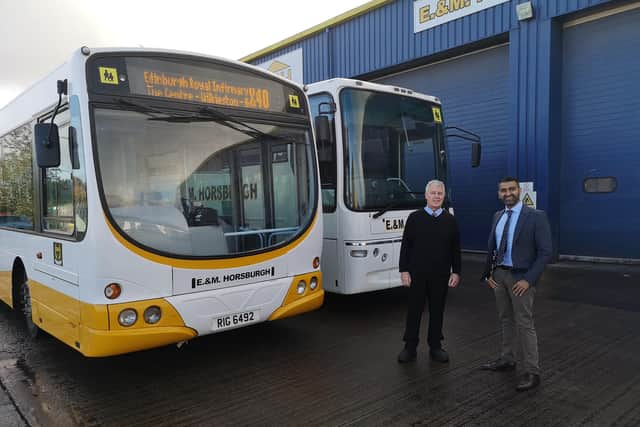Grangemouth hotelier has no reservations over his firm's fuel products
and live on Freeview channel 276
COP26 has now come to an end in Glasgow, but for environmentally friendly tech firm SulNOx Group the mission to cut down harmful emissions continues as it promotes its natural, biodegradable fuel products, which it states offer a “new and sustainable route” to significantly increasing fuel efficiencies across widely used hydrocarbon liquid fuels including diesel, petrol and biofuels.
The firm says its patented technologies have consistently shown fuel efficiency improvements of around eight to 10 per cent in tests on cars, vans, buses and trucks –providing an “increasingly recognised key solution to immediately combat global warming and air pollution”.
Advertisement
Hide AdAdvertisement
Hide AdBusinessman Nawaz Haq, known locally as the owner of the Helix Hotel in Grangemouth, is an executive director at the firm.


He said the SulNOx Group already supplies Scottish bus company EM Horsburgh’s 100-strong fleet, with SulNOxEco fuel conditioners.
Mr Haq added: "E&M Horsburgh are a contracted bus supplier to Falkirk Council, and not only does its success provide another real life demonstration and consolidation of the effectiveness of SulNOx Group technologies, it show businesses and councils must get involved to have immediate environmental impact.
"We comply with the most stringent fuel standards and there are no risks to users. In the case of E&M Horsburgh, for every £1 they have spent on our conditioner, they have saved £9.50."
Advertisement
Hide AdAdvertisement
Hide Ad“After recording fuel usage data before and after using SulNOxEco fuel conditioners, E&M Horsburgh also saw a remarkable increase in fuel economy of nine per cent.
“This consolidates other examples, including a haulage firm showing eight per cent savings across a fleet including 27 new Euro 6 trucks, operated over 12 months and covering 1.2 million miles.
“This shows even with the most modern engine and exhaust technologies available, we can vastly increase efficiencies by improving the burn profile of fuels, enabling more complete combustion.”
SulNOx Groups states there has been a global drive to alter fuels, in the transport sector in particular, including increasing bio-content in petrol and diesel in an effort to curb emissions.
Advertisement
Hide AdAdvertisement
Hide AdDoctor Dan Clarke, global head of science and technology at SulNOx Group, said: “A lot of talk around COP26 was about clean energy, which absolutely needs to be the ultimate goal.
"However, we have to acknowledge that is, unfortunately, a long way off. What SulNOx Group offers is a solution to the world we live in today, where fossil fuels are still very much in demand.
“The introduction of E10 petrol was designed to reduce CO2 emissions and is estimated to remove 750,000 tonnes of CO2 annually – the equivalent of 350,000 cars – from UK Roads.
“However, SulNOx Group existing technologies, if similarly integrated throughout fuel stations for petrol and diesel, could potentially remove the equivalent of over five million cars from UK roads and reduce CO 2 equivalent by 10 million metric tons.”
Advertisement
Hide AdAdvertisement
Hide AdBen Richardson, chief executive, added: “Through SulNOxEco fuel conditioners, we now have an immediate, cost-effective and sustainable solution to
decarbonise hydrocarbon liquid fuels which should realistically dominate transportation and other sectors in short to medium term whilst we await longer-term low/zero carbon solutions to reach 2050 targets.”
Thank you for reading this article on our free-to-read website. We're more reliant on your support than ever as the shift in consumer habits brought about by Coronavirus impacts our advertisers.
Please consider purchasing a subscription to our print newspaper to help fund our trusted, fact-checked journalism.
Comment Guidelines
National World encourages reader discussion on our stories. User feedback, insights and back-and-forth exchanges add a rich layer of context to reporting. Please review our Community Guidelines before commenting.
